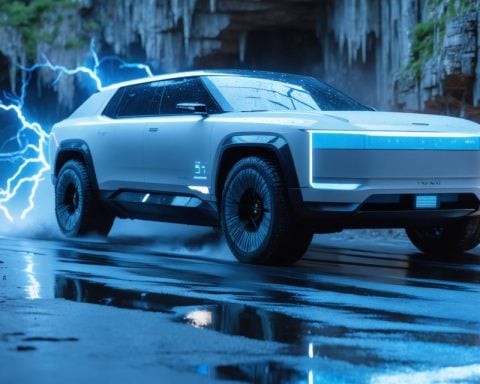Electric Vehicle Startup Declares Bankruptcy
Canoo Inc., an electric vehicle startup that once held promise, has officially filed for Chapter 7 bankruptcy, marking a drastic turn of events for the company that entered Oklahoma in 2021. This announcement, made on a Friday, revealed the company’s inability to maintain operations due to a lack of federal loan support and insufficient foreign investments.
Canoo has expressed deep disappointment over its failure to secure crucial funding from the U.S. Department of Energy’s Loan Program, despite being linked with high-profile contracts from entities such as NASA and the Department of Defense. The company had also hoped for international investment but faced challenges in those negotiations as well, leading its Board to make the hard choice of filing for insolvency.
As the bankruptcy process unfolds, a court-appointed trustee will oversee the liquidation of Canoo’s remaining assets. Recently, the company experienced a series of financial difficulties, culminating in unexpected furloughs at its Oklahoma City facility just a month prior.
Initially, Canoo generated excitement with its electric vehicles, delivering to esteemed clients including the U.S. Postal Service. However, financial hurdles prevented the company from expanding its production capabilities. The collapse of Canoo represents a significant setback for Oklahoma, which had anticipated job growth and economic benefits from the electric vehicle sector.
Implications of Canoo’s Bankruptcy on the EV Industry
The bankruptcy of Canoo Inc. is not merely a tale of a failed startup; it signals profound implications for the electric vehicle (EV) industry, particularly in Oklahoma and beyond. The industry’s growth hinges on the balance between innovation and sustainable funding. As investors grow wary, the failure of prominent players casts a long shadow over the sector’s perceived viability, potentially stifling future investments.
Canoo’s downfall highlights a critical tension in the global push for electric mobility: the reliance on federal support. Without substantial backing from programs like the U.S. Department of Energy’s Loan Program, startups face an uphill battle in securing the capital necessary for development and production. This reality could force other nascent companies to reevaluate their business models and may lead to a cautious approach within the investment community.
From an environmental perspective, the consequences of such bankruptcies can be dire. A stall in EV production hampers global efforts to reduce carbon emissions, as fewer electric vehicles on the road mean a continued reliance on fossil fuels. As governments enforce stricter emissions regulations, the market pressure may intensify for robust companies, possibly leading to further consolidations and a reduction in diversity within the EV sector.
Looking ahead, the trend of mergers and acquisitions may become the norm, as financially stronger corporations absorb startups that can no longer sustain themselves independently. The need for innovative designs and technology will persist, but the struggle for funding might stifle creativity and slow the momentum needed to combat climate change effectively. In this evolving landscape, the long-term significance of Canoo’s bankruptcy may extend far beyond its immediate corporate failure, reshaping the very fabric of the electric vehicle market.
Canoo Inc.: A Cautionary Tale in Electric Vehicle Innovation
Overview of Canoo Inc.’s Bankruptcy
Canoo Inc., a once-promising electric vehicle startup, has filed for Chapter 7 bankruptcy, signaling a dramatic shift in the company’s trajectory. Founded with the goal of revolutionizing urban transportation, Canoo aimed to produce versatile electric vehicles, yet the startup has faced significant challenges that ultimately led to its financial demise.
Pros and Cons of Canoo’s Business Model
Pros:
– Innovative Design: Canoo’s vehicles showcased unique designs aimed at maximizing space for passengers and cargo.
– Diverse Applications: The company aimed to cater to various markets, from personal transport to commercial needs.
Cons:
– Lack of Funding: Canoo struggled to secure critical funding, particularly from the U.S. Department of Energy, which hindered its production capacity.
– Insufficient Production Readiness: Despite promising prototypes, the company lacked the infrastructure to meet anticipated demand.
– Market Competition: Canoo faced intense competition from established auto manufacturers and other EV startups, making it difficult to carve out a niche.
Features and Specifications
Canoo’s electric vehicles were designed with several notable features:
– Modular Platform: The vehicles utilized a unique skateboard platform that allowed for various body styles.
– Flexible Interior: The designs emphasized configurable interiors, catering to both personal and commercial uses.
– Sustainable Technology: The vehicles promised environmentally friendly features, aligning with consumer trends towards sustainability.
Use Cases and Market Positioning
Canoo aimed to target a broad array of use cases:
– Urban Mobility Solutions: Designed for city dwellers, the vehicles were intended to ease commuting challenges.
– Commercial Fleets: The potential for utility vehicles in logistics and municipal services positioned Canoo as a player in the commercial EV market.
Limitations and Challenges
Canoo’s journey was marred by several limitations:
– Financial Mismanagement: The inability to secure necessary funding led to operational constraints.
– Construction Delays: The launch timelines faced significant setbacks, impacting investor confidence.
– Regulatory Hurdles: Navigating federal regulations for electric vehicles proved to be a challenge.
Market Analysis & Trends
The bankruptcy of Canoo underscores broader trends in the electric vehicle industry:
– Funding Climate: Companies in the EV sector require robust financial backing, especially in the initial phases of production.
– Partnership Importance: Collaborations with established corporations or government entities can significantly influence startup viability.
– Consumer Adoption: Growing consumer demand for sustainable transport solutions can provide opportunities for remaining players in the market.
Future Insights and Predictions
While Canoo’s collapse serves as a cautionary tale, the electric vehicle market continues to evolve:
– Increased Investment in EVs: Despite setbacks, investment in electric vehicles is projected to grow as governments highlight sustainability.
– Technological Advancements: Innovations in battery technology and autonomous driving could shape the future of EVs and revitalize interest in the industry.
– Consolidation Trends: The bankruptcy of Canoo may lead to mergers and acquisitions as larger companies look to expand their portfolios by absorbing struggling startups.
Conclusion
Canoo Inc.’s bankruptcy marks a significant moment in the electric vehicle landscape, illustrating the pressures faced by new entrants in a rapidly evolving market. As the industry moves forward, the lessons learned from Canoo’s experience may inform future strategies and investments.
For more insights and news on electric vehicles, visit Electric Vehicles.


















